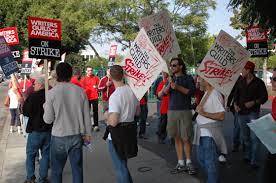An industry failure: why you should care about the writers’ strike

The Writer’s Guild of America goes on strike in California, the culmination of many recent failures of the entertainment industry. Photo credit: Wikimedia Commons
May 9, 2023
The last Variety cover is a stark departure from the classic headshot. Instead, there’s nothing but a blank white page behind small, bold words, pencil shavings lying in the bottom corner.
This is the latest mark of the new writers’ strike, a walk-out by the Writers Guild of America (WGA) — one of the most well-known large American unions. After six weeks of negotiations with the Alliance of Motion Picture and Television Producers, the WGA started their first full strike in 15 years, citing poor pay and treatment in the new streaming age. Producers and entertainment companies have failed to bring writers’ contracts up to date in the wake of the new boom of streaming. Instead of producing quality content, often something made in the writers’ room, these companies throw money into flashy, cash-grabbing projects, often ignoring the advice of experienced writers. These cash-grabs may pad the pockets of executives, but writers’ contracts remain outdated.
“Here is what all writers know: the companies have broken this business,” the WGA said in its strike announcement post. “They have taken so much from the very people, the writers, who have made them wealthy. But what they cannot take from us is each other, our solidarity, our mutual commitment to save ourselves and this profession that we love. We had hoped to do this through reasonable conversation. Now we will do it through struggle. For the sake of our present and our future, we have been given no other choice.”
As a result of the strike, the entertainment industry has been brought to a near standstill as writers in studios around the country enter their second week out of the room. But many people haven’t even noticed.
So why should we care, if we still get programming? Shows continue to run, movies continue to premiere — but it’s just a temporary cover-up. According to Oliver Mayer, a professor of dramatic writing at the University of Southern California School of Dramatic Arts, viewers will start to notice the drought of content in a couple weeks. As expected premiere dates start to pass by, studios will start to scramble. Television watchers will see more reruns, and we’ll see more statements from executives.
Some programming has already been noticeably affected — the programs that don’t have long delays between completion and premiere, like late-night shows. Notably, “The Tonight Show Starring Jimmy Fallon,” “Late Night With Seth Meyers,” “The Late Show With Stephen Colbert” and “Jimmy Kimmel Live!” have all gone dark (“Saturday Night Live” is electing to play reruns on TV, but no new episodes will be filmed).
The WGA may be winning in the court of public opinion — writers are highly respected in the industry by actors and directors, many of whom have stepped away from projects in solidarity with the strike. But the strike will continue until the industry steps up to the plate. Media corporations run on writers. As times change and streaming rates continue to rise, it’s up to these companies to match the demands of their core employees.










